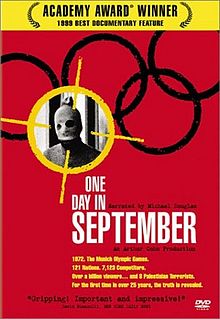- One Day in September
-
One Day in September 
Directed by Kevin Macdonald Produced by John Battsek
Lillian Birnbaum
Arthur Cohn
Andrew RuhemannNarrated by Michael Douglas Cinematography Neve Cunningham
Alwin H. KuchlerEditing by Justine Wright Release date(s) 22 October 1999 Running time 94 minutes Country  United Kingdom
United KingdomLanguage English One Day in September is a 1999 documentary film directed by Kevin Macdonald examining the 5 September 1972 murder of 11 Israeli athletes at the 1972 Summer Olympics in Munich, Germany. Michael Douglas provides the sparse narration throughout the film.
The film won the Academy Award for Best Documentary Feature in 2000.[1]
Contents
Subject matter
The documentary begins with an advertisement by the Munich Tourism Bureau with a beautiful young girl inviting the world to visit the city for the Olympics, then shows interviews with the wives of some of the murdered athletes, including Ankie Spitzer, widow of fencing coach Andre Spitzer. The film also features the first known filmed interview with Jamal Al-Gashey, allegedly the only surviving terrorist. Al-Gashey, who is in hiding in Africa, wears a cap and sunglasses and his face is slightly blurred.
There are various shots of the Games getting under way, and attention is given to the lax security the Germans had at the Games. The terrorists are seen preparing for the assault; Al-Gashey claims that he and the other members were trained in Libya before going to West Germany to begin the assault.
The assault is described by Al-Gashey as well as by some of the German security staff present. Footage of ABC anchor Jim McKay is interspersed, along with sound clips of Peter Jennings, to give an impression of events unfolding as they happened. General Ulrich Wegener, founder of the German counter-terrorist unit GSG 9, was also interviewed during the film, and was roundly criticized for his seemingly flippant attitude about the subject matter.
The film offers evidence to the allegation that the rescue operation was poorly planned and executed: the snipers were not prepared and were poorly positioned. The film implies that had the German government prepared better, the athletes might have been saved. Former Mossad Director Zvi Zamir, who was present at the airport during the final gunfight, is interviewed about his views on the failed rescue (he had previously been interviewed on this subject in an NBC profile of the Munich massacre broadcast during the Barcelona Olympics). Potential viewers should note that graphic photographs of the dead Israelis and Palestinians are shown at the end of this section in a photo-montage set to the Deep Purple song "Child in Time".
The film also alleges that the 29 October hijacking of a German Lufthansa jet and its subsequent release in exchange for the three Black September members being held for trial was a set-up by the German government, who did not want their failings to be made obvious in the trial.
Criticisms
After the movie's release, film critic Roger Ebert penned a review recommending the movie, praising Cohn's exhaustive research, but he also criticized the style of the film and the lack of information as to why the Palestinians carried out the raid. He also criticized the film's "tasteless conclusion", which was a montage of action shots and photos of victims' corpses with a rock music score. He continued these criticisms after the movie received an Academy Award, pointing out how the filmmaker had (in his opinion) subverted the Academy laws, which dictate that members must have seen all nominated films to vote. By limiting screenings to "friendly audiences," a film maker can effectively prevent anyone else from voting. Joe Berlinger, director of such acclaimed documentaries as Brother's Keeper and Paradise Lost, joined Ebert in criticizing Arthur Cohn's method of screening his film for "friendly audiences".[2][3]
Notes
- ^ "NY Times: One Day in September". NY Times. http://movies.nytimes.com/movie/186705/One-Day-in-September/details. Retrieved 2008-11-22.
- ^ "One Day In September". rogerebert.com. http://rogerebert.suntimes.com/apps/pbcs.dll/article?AID=/20010309/REVIEWS/103090303/1023. Retrieved 2007-07-01.
- ^ "Answer Man Chicago Sun-Times". Chicago Sun-Times. http://rogerebert.suntimes.com/apps/pbcs.dll/article?AID=/20000423/ANSWERMAN/4230305/1023. Retrieved 2008-10-01.
Companion book
- Reeve, Simon (New York, 2001), One Day in September: the full story of the 1972 Munich Olympic massacre and the Israeli operation 'Wrath of God' ISBN 1-55970-547-7
External links
- One Day in September at the Internet Movie Database
- Munich 11 1972 Israeli Olympic Athletes
Films directed by Kevin Macdonald 1990s One Day in September (1999)2000s Being Mick (2001) · Touching the Void (2003) · The Last King of Scotland (2006) · State of Play (2009)2010s The Eagle (2011) · Life in a Day (2011)Academy Award for Best Documentary Feature 1981–2000 Genocide (1981) · Just Another Missing Kid (1982) · He Makes Me Feel Like Dancin' (1983) · The Times of Harvey Milk (1984) · Broken Rainbow (1985) · Artie Shaw: Time Is All You've Got and Down and Out in America (1986 - tie) · The Ten-Year Lunch (1987) · Hôtel Terminus: The Life and Times of Klaus Barbie (1988) · Common Threads: Stories from the Quilt (1989) · American Dream (1990) · In the Shadow of the Stars (1991) · The Panama Deception (1992) · I Am a Promise: The Children of Stanton Elementary School (1993) · Maya Lin: A Strong Clear Vision (1994) · Anne Frank Remembered (1995) · When We Were Kings (1996) · The Long Way Home (1997) · The Last Days (1998) · One Day in September (1999) · Into the Arms of Strangers: Stories of the Kindertransport (2000)
Complete list · (1942–1960) · (1961–1980) · (1981–2000) · (2001–2020) Categories:- 1999 films
- British films
- English-language films
- British documentary films
- Best Documentary Feature Academy Award winners
- Documentary films about terrorism
- Munich Massacre
- Films directed by Kevin Macdonald
- Documentary films about the Olympics
- 1990s documentary films
Wikimedia Foundation. 2010.
